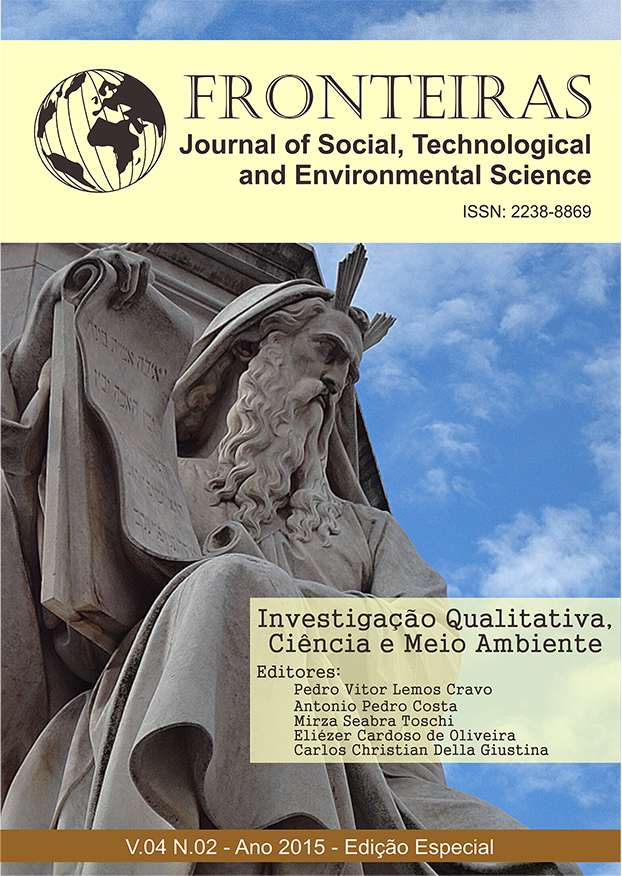O Uso das Tecnologias e o Processo Ensino e Aprendizagem de Matemática no Ensino Médio no Estado de Goiás
DOI:
https://doi.org/10.21664/2238-8869.2015v4i2.p251-264Resumo
Este artigo apresenta o resultado parcial da pesquisa de mestrado intitulada “O uso das tecnologias e o processo ensino e aprendizagem de matemática no ensino médio estadual em Goiás - fatores humanos e sociais para a implantação” em desenvolvimento no Programa de Pós-Graduação em Sociedade, Tecnologia e Meio Ambiente, do Centro Universitário de Anápolis – UniEVANGÉLICA e tem como objetivo analisar a inclusão/ou não inclusão das tecnologias digitais no de processo ensino e aprendizagem de matemática na rede pública de educação do Estado de Goiás. Para tanto, foram selecionadas 5 (cinco) colégios nas cidades de Catalão, Goiânia, Jussara, Luziânia e Porangatu representativos das cinco mesorregiões do Estado. Os resultados iniciais revelam um quadro preocupante, apesar das exigências da sociedade no século XXI, no que se refere ao novo paradigma educacional através da inclusão das tecnologias digitais na educação.
Palavras chave: Tecnologia; Ensino e Aprendizagem; Formação de Professor de Matemática e Infraestrutura.
Referências
Castells M 1999. A Sociedade em Rede. A era da Informação: economia, sociedade e cultura. Volume I São Paulo, Editora Paz e Terra.
Castells M 2003. A Sociedade em Rede. A era da Informação: economia, sociedade e cultura. Volume I São Paulo, Editora Paz e Terra.
D'ambrosio U 1989. Da realidade à ação - Reflexões sobre Educação e Matemática. Campinas.
D'ambrosio U 2002. Educação matemática: da teoria à prática. Ed. Papirus, 9º edição. Campinas.
Demo P, 1997. Educar pela Pesquisa. Campinas. SP: Autores Associados.
Freire P 1996. Pedagogia da autonomia: saberes necessários à prática educativa. São Paulo: Paz e Terra.
Freire P 2005. Pedagogia do Oprimido. Rio de Janeiro: Paz e Terra.
Hargreaves A 2003. O Ensino na Sociedade do Conhecimento: a educação na era da insegurança. Coleção Currículo, Políticas e Práticas. Porto: Porto Editora.
IBGE. Internet cresce entre os mais pobres e cai entre os mais ricos, aponta IBGE. [cited 2014 feb 10]. Available from: http://economia.ig.com.br/2013-05-16/internet-cresce-entre-os-mais-pobres-e-cai-entre-os-mais -ricos-aponta-ibge.html.
Libâneo JC 1998. Adeus Professor, Adeus Professora? Novas exigências educacionais e profissões docente. São Paulo: Cortez.
Machado NJ 2002. Matemática e Realidade. 2ª Ed, Cortez/Autores Associados, 1987. MERCADO, Luis Paulo Leopoldo, Novas Tecnologias na Educação: Reflexão sobre a Prática. Maceió: Universidade Federal de Alagoas.
Pozo JI 2002. Aprendizes e mestres. Porto Alegre: Artmed.
Pozo JI. A sociedade da aprendizagem e o desafio de converter informação em conhecimento. Revista Pátio. 2004 Oct [cited 2009 mai 08]; 8(31). Available from: http://www.revistapatio.com.br/ sumario_conteudo.aspx?id=386.
Sales DC 2006. Reestruturação do Projeto Político Pedagógico da Escola Estadual Imaculada Conceição de acordo com a proposta curricular de educação no campo. [cited 2014 feb 10]. Available from: http://.com/viewer?3.mec.gov.br/uft/file.php/1/moddata/data/850/1115/2279/ARTIGO.
Valente JA 1993. Computadores e conhecimento: repensando a educação. Campinas: UNICAMP.
Vygotsky LS 2001. A construção do pensamento e da linguagem. São Paulo: Martins Fontes.
Downloads
Publicado
Como Citar
Edição
Seção
Licença
Esta revista oferece acesso livre imediato ao seu conteúdo, seguindo o princípio de que disponibilizar gratuitamente o conhecimento científico ao público proporciona maior democratização mundial do conhecimento.
A partir da publicação realizada na revista os autores possuem copyright e direitos de publicação de seus artigos sem restrições.
A Revista Fronteiras: Journal of Social, Technological and Environmental Science segue os preceitos legais da licença Creative Commons - Atribuição-NãoComercial 4.0 Internacional.


